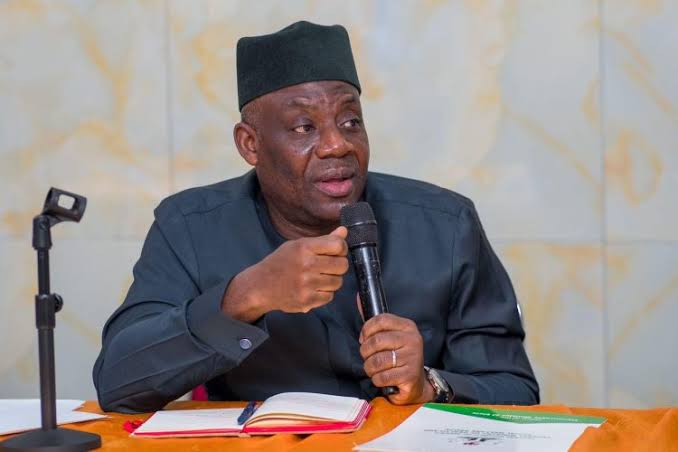The Federal Government plans to allocate a significant portion of its budget to debt servicing over the next three years, surpassing allocations for capital expenditures.
This is according to the recently approved 2025-2027 Medium-Term Expenditure Framework and Fiscal Strategy Paper.
To fund its expenditure plans, the government also intends to borrow an additional N31.24tn over the next three years.
This will add to Nigeria’s already substantial debt stock, which stood at N134.3tn as of June 2024. If this borrowing trend continues, Nigeria’s debt stock could be near N170tn by 2027.
The planned borrowing will primarily finance budget deficits and other expenditures, potentially pushing Nigeria’s debt-to-revenue ratio further into unsustainable territory.
The government intends to borrow N9.22tn in 2025, increasing to N8.78tn in 2026 and N13.24tn by 2027.
Of the total N31.24tn, domestic borrowing will account for the lion’s share at N24.98tn, while foreign borrowing will contribute N6.25tn.
For 2025, domestic borrowing is pegged at N7.37tn, which is 80 per cent of the borrowing projection for the year, while foreign borrowing will make up N1.84tn.
This pattern is expected to continue, with domestic borrowing set at N8.78tn in 2026 and N10.59tn in 2027.
Foreign loans, on the other hand, will rise modestly, from N1.76tn in 2026 to N2.65tn in 2027.
The fresh borrowings will be used to fund the government’s widening budget deficits, which are projected at N13.08tn in 2025, N12.14tn in 2026, and N13.76tn in 2027.
The deficits reflect the ongoing struggle to bridge the gap between revenues and expenditure, despite recent fiscal reforms such as the removal of fuel subsidies and exchange rate unification.
The deficits, representing 3.87 per cent of GDP in 2025 and narrowing slightly to 3.01 per cent by 2027, highlight the government’s growing reliance on debt to fund its spending priorities.
The MTEF document further reveals that debt servicing is projected to cost N50.39tn between 2025 and 2027, exceeding the N48.93tn set aside for capital expenditures.
This discrepancy raises concerns about fiscal sustainability and economic development.
The PUNCH reports that debt servicing is expected to rise from N15.38tn in 2025 to N19.49tn in 2027, marking a sharp 26.7 per cent increase over three years.
This upward trajectory highlights the growing burden of Nigeria’s debt obligations. For perspective, the FG spent N8.56tn on debt servicing in 2023, meaning that by 2027, the figure would have more than doubled, representing a 127.7 per cent increase in just four years.
Debt servicing will account for 34.06 per cent of total annual expenditures during the three years, raising concerns about the nation’s fiscal sustainability.
Experts fear that the high cost of servicing debts could further strain government resources, leaving little room for investments in critical infrastructure and development programmes.
Capital expenditure, which is crucial for infrastructure development, is projected to grow by only 0.18 per cent, rising from N16.48tn in 2025 to N16.51tn in 2027.
However, this growth pales in comparison to the projected rise in debt servicing. Over the three years, the FG plans to spend 2.98 per cent more on servicing debts than on capital projects, a trend that economists say could hinder Nigeria’s development goals.
In 2025, capital expenditure will make up 34.44 per cent of the total budget, slightly higher than the 32.11 per cent allocated to debt servicing.
By 2027, the disparity is evident, with debt servicing climbing to 37.2 per cent of total spending, while capital expenditure accounts for 31.51 per cent.
In 2025, capital expenditure will make up 34.44 per cent of the total budget, slightly higher than the 32.11 per cent allocated to debt servicing.
By 2027, the disparity is evident, with debt servicing climbing to 37.2 per cent of total spending, while capital expenditure accounts for 31.51 per cent.
A closer look at the figures shows that debt servicing in 2025 will cost N15.38tn, while capital expenditure will receive N16.48tn.
In 2026, debt servicing is projected to increase by 0.9 per cent to N15.52tn, with capital expenditure dropping by 3.28 per cent to N15.94tn.
By 2027, debt servicing will jump by 25.58 per cent to N19.49tn, compared to a modest 3.58 per cent rise in capital expenditure, which will hit N16.51tn.
These figures highlight a troubling trend where the cost of debt servicing is growing at a much faster rate than capital investment. The disparity could exacerbate Nigeria’s infrastructure deficit and hinder economic growth.
However, the Debt Management Office has flagged the rising debt stock and high servicing costs as significant risks to fiscal stability.
Reacting, the President of the Nigerian Economic Society, Prof Adeola Adenikinju, told The PUNCH that “there is little we can do regarding our debt servicing. This is an obligation that we owe, and it will do a lot of damage to our image if we don’t pay. That is a consequence of past years of mismanagement and dependence on debt to run the government.”
He lamented that most of the time, the government does not meet up with the provisions for capital expenditure in the budget.
Adenikinju added, “Even when they say N48tn, you can be assured that they are not going to spend that.”
He noted that spending on debt servicing will not yield any positive benefit for the Nigerian economy.
“It is sad because debt service will not do anything positive for the economy. It is not going to improve infrastructure. It is not going to enhance economic growth. It is not going to yield any significant positive effect on the economy. We have been wasteful in the past, and that is the consequence we have to deal with now,” he said.
Sharing the same sentiment, a development economist, Dr Alias Aliyu, described the situation as appalling, adding that “It is an anomaly that we are practising in Nigeria.”
He added that capital expenditure benefits Nigerian citizens and stressed the need for the government to ensure that capital spending exceeds debt servicing.
Advertisement





